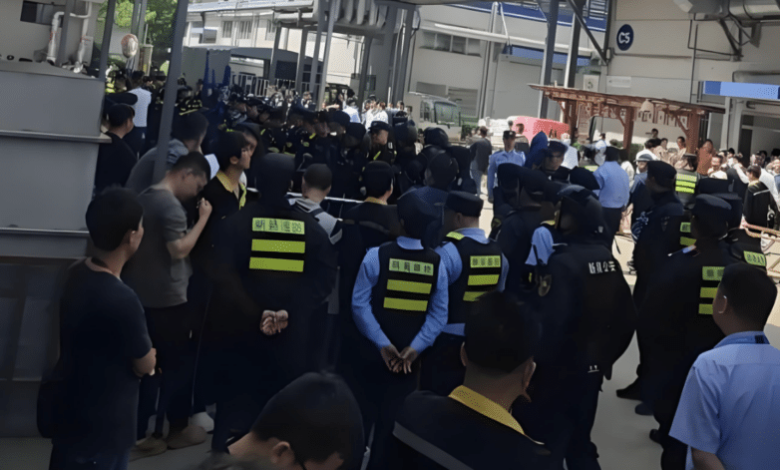Strike at BYD factory in Wuxi: workers seek fair treatment

[ad_1]
Last week, a strike occurred at the BYD factory in Wuxi, Jiangsu province, China. Images and short videos circulating online showed a large gathering of employees within the factory compound, with some even lying on the ground, covered by blue sheets placed by the police.
– Advertisement –
The Reason for the Strike:
According to reports, the main reason for the employees’ discontent was the implementation of a four-shift system and a five-day, eight-hour work schedule. This would result in the loss of overtime pay, leading to a significant reduction in their income.
– Advertisement –
The BYD factory in Wuxi was previously owned by the American company Johnson Controls. Last year, BYD acquired Johnson Controls’ factories in Chengdu and Wuxi for a price of 15.8 billion yuan (2.19 Billion USD). After the acquisition, both Johnson Controls and BYD issued a joint announcement, promising that employee benefits would remain unchanged and, in some cases, even slightly improved. They also assured that severance pay would be provided to laid-off workers. However, it is reported that BYD did not fulfill these commitments, contributing to dissatisfaction among the employees.
The Overtime Culture:
The employees protested against eliminating overtime, which may seem surprising from an international perspective. While the rest of the world seeks to reduce working hours, Chinese workers are demanding an increase in working time. Why is this the case?
– Advertisement –

Chinese workers do not necessarily enjoy working overtime; they are compelled to do so due to circumstances. Factories often set basic wages just above the government’s minimum wage to keep labor costs low. To make ends meet, employees accept long hours of overtime work since Chinese labor law requires employers to pay 1.5 times the regular wage for overtime and double the wage for weekend overtime.
The job postings for the BYD factory in Wuxi in the past two months indicated a basic wage of 2,490 yuan (345 USD), which coincides with the minimum wage in Jiangsu province. Stable overtime hours are necessary to earn a monthly income of 5,000 to 6,500 yuan (690 to 897 USD) advertised by intermediaries. In electronics factories, a 10-hour workday is considered the minimum, and some factories even require employees to work 12 to 13 hours per day. By canceling overtime, BYD effectively reduced the maximum monthly income for employees to just over 3,000 yuan, which is seen as a fairly low salary.
Currently, BYD has not responded to this incident, and the reasons for the sudden change in the overtime policy remain unclear. However, reducing overtime is a common strategy employed by many companies to force employees to resign indirectly. If companies initiate layoffs, they are legally obliged to provide severance pay.
Speculators wonder if these actions reflect possible layoffs in the Chinese auto industry. Reports of worker layoffs by Li Auto surfaced today, supporting this case.
Source: LaoWuHongGuan






